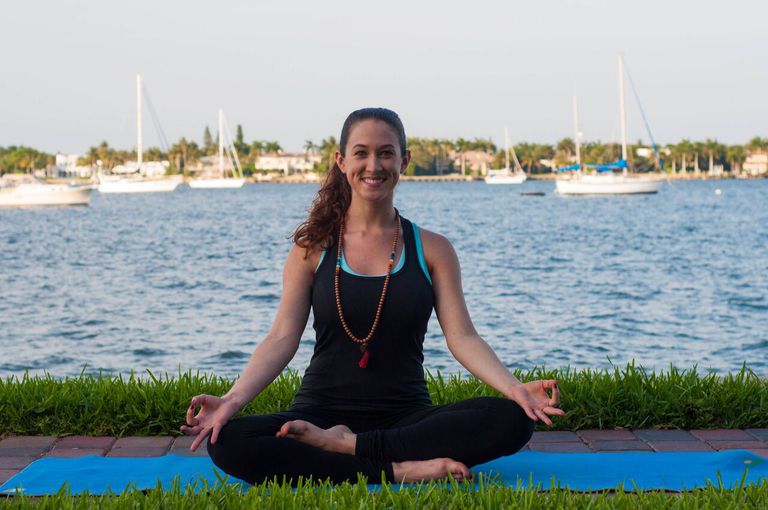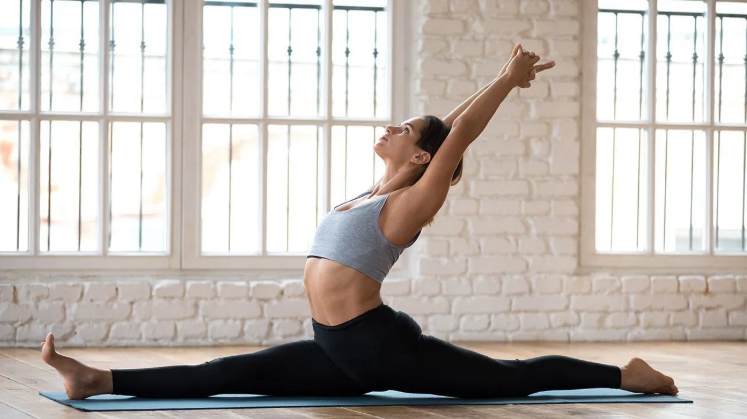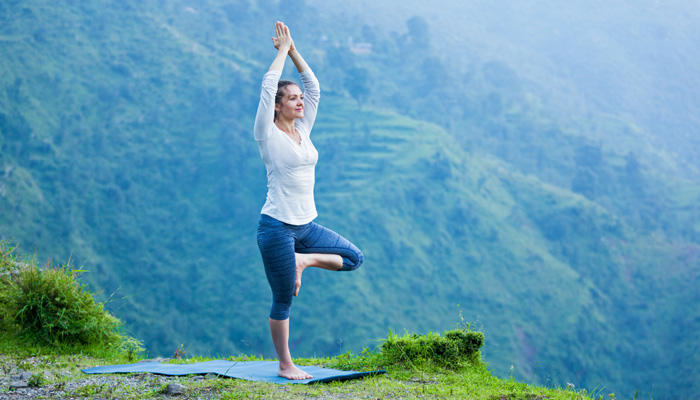Runners are notorious for skipping out on cross-training exercises so they can squeeze in more miles. But non-stop running is a good way to invite injury, putting a damper on future runs. Yoga is the perfect complement to running as it can help stretch and strengthen the zones that runners use most, keeping the whole body in tip-top shape and increasing the likelihood that you can run again another day..
As Florida yoga instructor Brittany Szafran of Sass Yoga put it, “Cross-training with yoga can help athletes reduce their risk of injury and gain strength, flexibility and stamina to improve their performance in a range of sports.” Szafran notes that the key when doing yoga is to focus on your breathing, “unite your breathe with each and every movement to reap the full benefits.”
Here are Szafran’s tips for the best yoga poses that runners can use to recharge their bodies and their minds.
Low lunge
:max_bytes(150000):strip_icc():format(webp)/__opt__aboutcom__coeus__resources__content_migration__mnn__images__2017__05__low-lying-lunge.838x0_q80-cc728fc593424781a2b5da8b4de60f0c.jpg)
Bend your right knee at a 90-degree angle until it is aligned over your right heel. Lower your left leg to the floor and slide back until you feel a comfortable stretch in your quadriceps and hip flexors. Rest your arms on the floor for balance. Or, if you feel comfortable, raise them perpendicular to the floor for a stretch throughout the back and rib cage. Repeat on the other side.
Chair
:max_bytes(150000):strip_icc():format(webp)/__opt__aboutcom__coeus__resources__content_migration__mnn__images__2017__05__chair-pose.838x0_q80-1ab8e3c05e554e4d990840cc82415211.jpg)
Stand with your feet hip-distance apart and firmly planted into the floor. Inhale while raising your arms overhead. Exhale and bend the knees until the thighs are as close to parallel to the floor as feels comfortable. Lengthen your back by reaching upward with your arms while continuing to press your heels into the floor.
Standing forward bend
:max_bytes(150000):strip_icc():format(webp)/__opt__aboutcom__coeus__resources__content_migration__mnn__images__2017__05__intense-forwardbend.838x0_q80-55c6d9b8a84440ce90242e4f67d5b7f5.jpg)
Stand with your feet hip-distance apart and your feet firmly planted on the floor. Exhale and bend forward at the hips, lengthening the torso while you reach toward the floor. If it’s comfortable, brace your palms on the floor or wrap your hands around your ankles. If this is too deep of a stretch, follow Szafan’s example by placing blocks on the floor that you can use to brace yourself while you stretch.
Camel
:max_bytes(150000):strip_icc():format(webp)/__opt__aboutcom__coeus__resources__content_migration__mnn__images__2017__05__camel-pose.838x0_q80-6aec632618c64142bfbb7b055994f7db.jpg)
Kneel on the floor with your knees hip-distance apart. Press your toes gently into the floor and rest your hands on your lower back. Inhale while extending through your back and then gently ease back. Do not collapse your lower back and keep your head neutral. For a deeper stretch, press your shins and the tops of your feet into the floor and lower your hands back until you can support yourself by holding your ankles.
Reclining Hero
:max_bytes(150000):strip_icc():format(webp)/__opt__aboutcom__coeus__resources__content_migration__mnn__images__2017__05__reclining-hero.838x0_q80-a42d829617f344af8b94d06ddd8206de.jpg)
Start in Hero pose, sitting on the floor with your knees touching and the tops of your feet pressed into the floor. Inhale and lower yourself back to the floor. As Szafran demonstrates, you can use a block under your butt to ease the stretch. For a deeper stretch, remove the block and recline all the way back to the floor.
Boat
:max_bytes(150000):strip_icc():format(webp)/__opt__aboutcom__coeus__resources__content_migration__mnn__images__2017__05__boat-pose.838x0_q80-623d387a46ed47b087cf53bce5303f0e.jpg)
Sit on the floor with your knees bent and feet flat on the ground. Lean back slightly, lifting your feet and keeping your knees bent until your calves are parallel to the floor. Be sure to draw in your belly and keep your spine straight while you balance on your butt. Use your arms to make this pose easier (by placing your hands on the ground behind you for balance) or more challenging (by extending them at your sides).
Pigeon
:max_bytes(150000):strip_icc():format(webp)/__opt__aboutcom__coeus__resources__content_migration__mnn__images__2017__05__pigeon-pose.838x0_q80-7211fcbc19534888a74df00f74ed30dd.jpg)
Begin on all fours with your hands and knees on the floor. Place your left knee on the ground by your left wrist as your left foot extends toward the right side of your mat. Make sure that your hips stay centered and your right leg remains neutral (in other words, don’t twist). Use your arms to brace yourself, or deepen the stretch by lowering the upper body forward and resting your elbows on the floor in front of you or stretching your arms out in front. Repeat on the other side.
Seated forward fold
:max_bytes(150000):strip_icc():format(webp)/__opt__aboutcom__coeus__resources__content_migration__mnn__images__2017__05__seated-forward-fold.838x0_q80-a500de51e2ba44d899aa2f592ef97d07.jpg)
Sit on the floor with your legs extended straight in front of you. Inhale, reaching your arms out to the side and then over your head to lengthen your spine. Exhale and bend forward from the hips, being careful not to stretch any further than what feels comfortable.
Sphinx
:max_bytes(150000):strip_icc():format(webp)/__opt__aboutcom__coeus__resources__content_migration__mnn__images__2017__05__sphinx.838x0_q80-592eb4c035624339b1a121f64eb0a5c1.jpg)
Lie on your belly with your legs side-by-side and stretching out toward the wall behind you. Place your elbows on the floor slightly forward of your shoulders with your forearms parallel to each other. Inhale and lift your upper body off the floor into a gentle back bend.
Upward Facing Dog
:max_bytes(150000):strip_icc():format(webp)/__opt__aboutcom__coeus__resources__content_migration__mnn__images__2017__05__upward-facing-dog.838x0_q80-d40bc21ed11949239a90201805cc5979.jpg)
From the Sphinx pose, draw your palms back and plant them near your upper rib cage. Inhale while straightening your arms and lifting your chest and legs off the floor. Lift through the shoulder blades while keeping your back soft and your gaze straight ahead.
Locust
:max_bytes(150000):strip_icc():format(webp)/__opt__aboutcom__coeus__resources__content_migration__mnn__images__2017__05__locust-pose.838x0_q80-04067ce8f7c0459181b8366c3acda017.jpg)
Lie on your belly with your arms at your sides and your palms facing the ceiling. Exhale while lifting your legs, arms, upper torso and head off of the floor. Reach through your legs while actively stretching from your heels to your fingertips.
Plank
:max_bytes(150000):strip_icc():format(webp)/__opt__aboutcom__coeus__resources__content_migration__mnn__images__2017__05__plank-pose.838x0_q80-0543d8996e5d45439191cab7dd0498cc.jpg)
Start in sphinx or locust pose and bring the hands back and plant them near the chest. Inhale while straightening the arms and curling the toes under. Keep the shoulders over the wrists and the torso parallel to the floor. Strengthen and lengthen through the heels to keep your hips from falling toward the floor or pushing up toward the ceiling.
Supine belly twist
:max_bytes(150000):strip_icc():format(webp)/__opt__aboutcom__coeus__resources__content_migration__mnn__images__2017__05__supine-belly-twist.838x0_q80-78761a9aa2cb45bdb573b2715b77f081.jpg)
Lie on your back with your arms out at your side and your palms facing down. Bring your right knee to your chest. While exhaling, lower your right knee to the left and turn your head to look over your right shoulder. Make sure both shoulders stay flat on the floor. Repeat on the other side.


